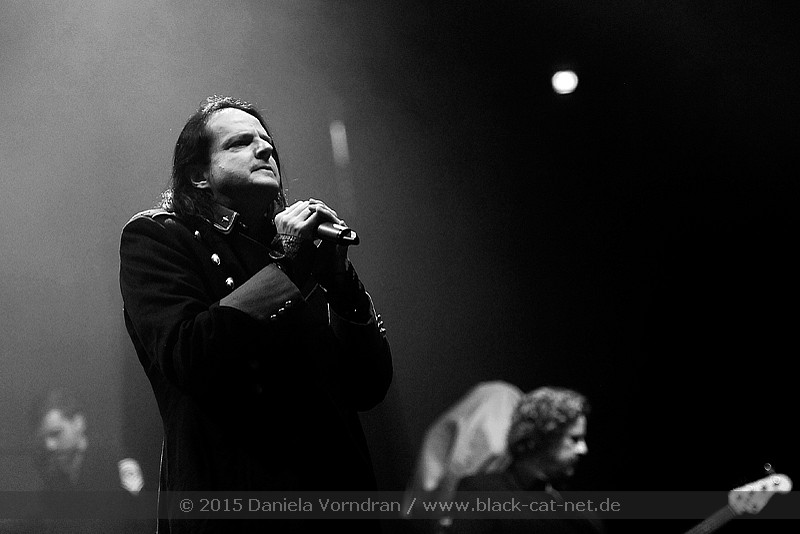 Interview with
Interview withOswald Henke (Goethes Erben): My heart belongs to music theatre.
Quite recently in a stab of nostalgia I was rereading some old reviews of the dark scene and among others I chanced on the Coroner’s reviews of the series of albums by GOETHES ERBEN. And dark romantic cover arts, Oswald’s column “Henke Trocken” in Orkus magazine, painfully familiar tunes to the hits ‘Ich liebe Schmerzen’, ‘Vermisster Traum’, ‘Glasgarten’ returned to my memory. In the series of articles published lately, which were devoted to the brief classification of the styles on the dark scene, GOETHES ERBEN have been defined as the founders of the European darkwave, and it is beyond controversy. Also Goethes Erben helped me to discover such genre-branch as NDT.
That’s a whole lot of words for the GOETHES ERBEN’s influence on the dark scene and gothic subculture consequently. But let’s be concise and stop to talk about the obvious facts. By a happy coincidence we was given a chance to ask some questions to the renewed Goethes Erben and their permanent leader and front man Oswald Henke (who was said to visit Moscow in January 2017 with his DJ-set)
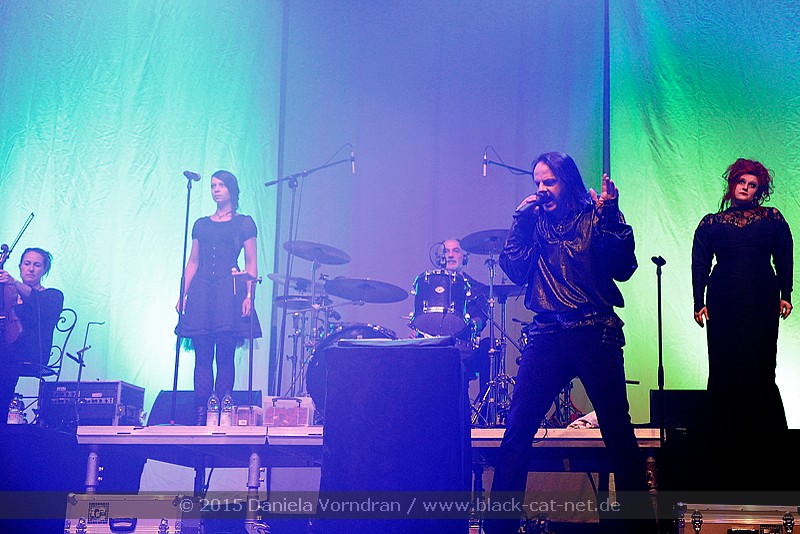
Reflections of Darkness [RoD]: The first question will probably be kind of unpredictable, but still… GOETHES ERBEN was one of the key projects in the "old school" dark scene with a very confident discography and the development of creative potential, but then too suddenly ceased to exist. Why did you choose to focus on the other projects? And why did you decide to resuscitate GOETHES ERBEN after 10 years?
Oswald Henke: I needed a break from GOETHES ERBEN and extremely expensive musical theatre performances, and for this reason Mindy Kumbalek and I decided to freeze the project GOETHES ERBEN for a while. Meanwhile, Mindy Kumbalek completely said goodbye to the music and lives a completely different life. As for me, I wanted to show my full creative potential, so me and my fellow colleagues established the projects HENKE and FETISCH:MENSCH. HENKE broke up after releasing two albums, three EPs and one Live album. What will happen to the project FETISCH:MENSCH is still unknown. I would like to fill GOETHES ERBEN overwhelmingly creative, and now I have no time for other artistic projects that may require a lot of time.
RoD: Are there any fundamental differences between GOETHES ERBEN 1996, GOETHES ERBEN 2006 and modern GOETHES ERBEN? Can we say that this is completely different formation? Or is it all the same way?
Oswald Henke: GOETHES ERBEN is just me now, since Mindy Kumbalek no longer wants to be a part of GOETHES ERBEN after the break. Now she has other priorities. Thus, I am the only one representative of GOETHES ERBEN and I’m looking for musicians for concerts and performances. They may be old "companions" such as Marcus Kestner or Suzanne Reinhardt, but also a completely new, as former musicians from the project HENKE - Tobias Schafer and Tom Redel (Ex TomBola). At the moment there is a membership of about 12 musicians who go onto the stage with me in various performances. The only member of the band GOETHES ERBEN is me, everyone else are musicians hired by me for a time.
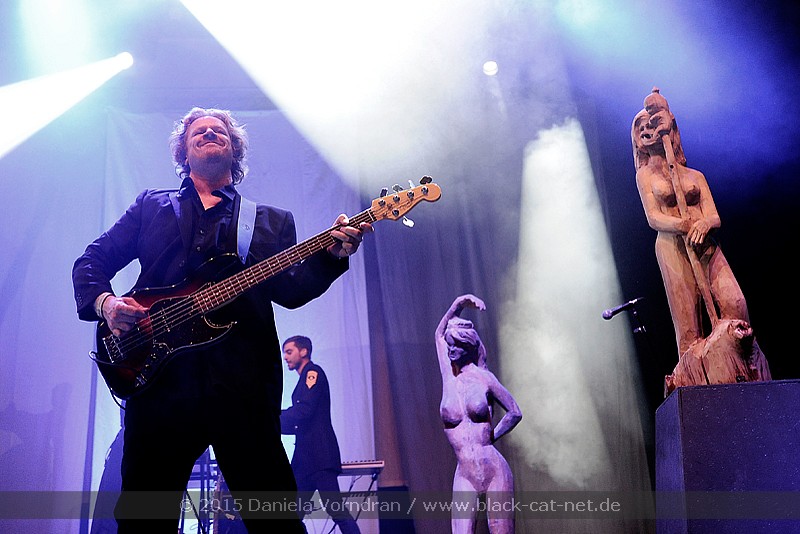
RoD: Do you feel the differences between the audience of those days and nowadays? Can we say that the listener of GOETHES ERBEN became more mature and sophisticated? Is his behaviour changed?
Oswald Henke: The audience was growing up with us and perhaps became more mature and sophisticated. As regards the life, the audience is very interested in what I create, and our fans also take part in it. For example, a new production of ‘Menschenstille’ was very welcomed, as well as the reactivation of GOETHES ERBEN.
RoD: The return of GOETHES ERBEN was quite loud, for example, in 2014 you made your performance in the Dome hall of the National Palace in Leipzig. What thoughts did you have getting up on that stage? Did you expect such a warm welcome?
Oswald Henke: If there weren’t those two concerts in Leipzig, there wouldn’t be ‘Menschenstille’. I wanted to rehearse and to act in new performances. The audience also wanted to watch us, and after those two nights the future of GOETHES ERBEN was destined. It was two nights in Leipzig with an attentive audience, which was pleased to immerse into the ‘Niemandsland’ during the concert once again.
RoD: Just a question, it can be said, "technical". I believe that the standard festival ground and the stage of the National Palace are perceived completely different both by your musicians and the audience. But still, where is it “closer to real life” to you to act? What is closer to the present line-up of GOETHES ERBEN?
Oswald Henke: I make my appearance in festivals primarily in order to give new people the opportunity to meet us. My heart belongs to the musical theatre and this format can hardly be presented as a part of the festival. But we can awaken the interest in the turnout, since we are something different on the stage during the festival, than the other groups that are also there. But GOETHES ERBEN were always different and never been a band setting the mood of the festival. At festivals, with very few exceptions (Amphi Festival 2015), I take action with one group but not with the dance ensemble, with one dancer as the maximum, because it is unlikely that a single organizer will invite the group comprising 10 musicians, 8-9 dancers, 4 technicians, costume designer, makeup artist, etc.
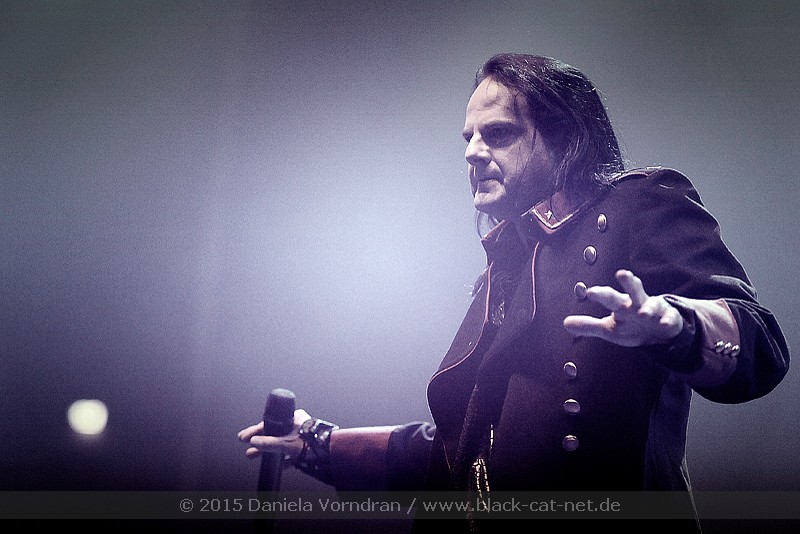
RoD: After the gig in Leipzig, you didn’t give any concerts for a year. What was the reason of this pause?
Oswald Henke: After the gigs with the album ‘Rückkehr ins Niemandsland’ I’ve changed the group and, first of all, I had to go to the rehearsal place to start working with my team on ‘Menschenstille’.
RoD: On the photos from WGT 2015 your listeners hold the lighted candles in their hands during your performance. Was it the part of the show or the flash mob from your fans, so to speak? By the way, it looks amazing even in the photos.
Oswald Henke: Since the open fire on the stage was prohibited, we encouraged our fans to bring candles.
RoD: In the autumn you have planned the performances in collaboration with SARA NOXX, gigs of GOETHES ERBEN and your traditional reading. What awaits the guests of these events? And what other plans does GOETHES ERBEN have in 2016?
Oswald Henke: In the autumn, we will stand on the stage again with the new line-up: there won’t be Suzanne Reinhardt, Sue Ferrers and Frank Choices, but Carsten Klatte will return to the live ensemble. Thus, in the group there will be two people less and there won’t be any dancers. From a musical point of view, we will play songs of GOETHES ERBEN, thus, more concert programs and less musical theatre. In December the new team will be presented again, because Tom Redel (Ex-HENKE) comes back as a new guitarist and a new pianist Sebastian Boettcher will play on an electronic piano instead of Tobias Schafer. In 2016 I want to focus on the writing of the new theatrical performance ‘Meinungsstörung’, which I would bring to the stage in 2018/2019 years with pleasure, if it is able to finance it somehow.
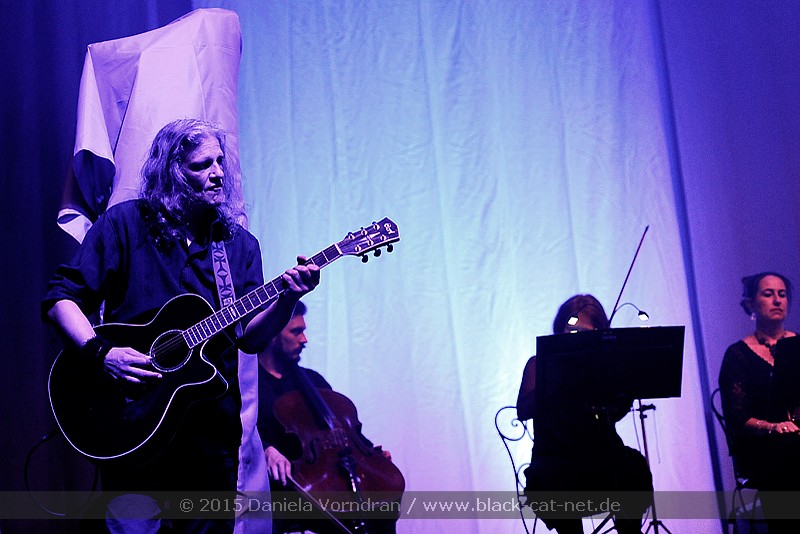
RoD: Can you please tell us about your readings? It has very tight and regular schedule, and it’s interesting to understand the format in which you do your reading. What is it like? Is it a recital? One-man show? Companionship?
Oswald Henke: I spend two kinds of readings in Germany. One kind of them is reading in the living room, as the private meetings from 8 to 20 guests. These readings are very intimate, informative, and often rather grim. In the official reading, as a rule, there are from 30 to 150 people, and though these readings are proposed to have serious motives, they are full of humour at the same time. I'm reading something from my four books, but many of the texts have not been published or just appeared in the form of a column. Sometimes, reading has some political orientation, because as a creative person I’m also the conscience of society. I would like to encourage reflection and discussion.
RoD: How do you define the content of certain readings? What does it depend on? On the venue? On the current events? On the mood?
Oswald Henke: It depends on the evening itself and of course from the days of the readings, when any politically or socially important event could happen.
RoD: Do you have, so to speak, your own "inner censor"? Are there any topics you will never be allowed to speak about and which you are not going to mention in your work?
Oswald Henke: I suppose each person unconsciously censors himself, so I'm afraid I do it sometimes too, but consciously I have no taboo topics. First of all, I try not to offend or to point the finger at people or groups of people. (I don’t speak about stupid Nazis and terrorists and Erdogan, because I do not understand fascists and despots, no matter what direction they follow).
RoD: I cannot fail to mention very original idea with the merch "Oswald says...", every new month has a new motive with your new quote. I think it's pretty cool and much more interesting than standard fan attributes with the permanent design. How was this idea developed?
Oswald Henke: This idea came during a phone conversation with my artist Ulrike Rank, with whom we are working for many years. I’m trying, therefore, to finance a new musical performance of ‘Meinungsstörung’ by funds received from the sale of t-shirts that have limited edition. This series will be available until December, and we will see what happens in 2017.
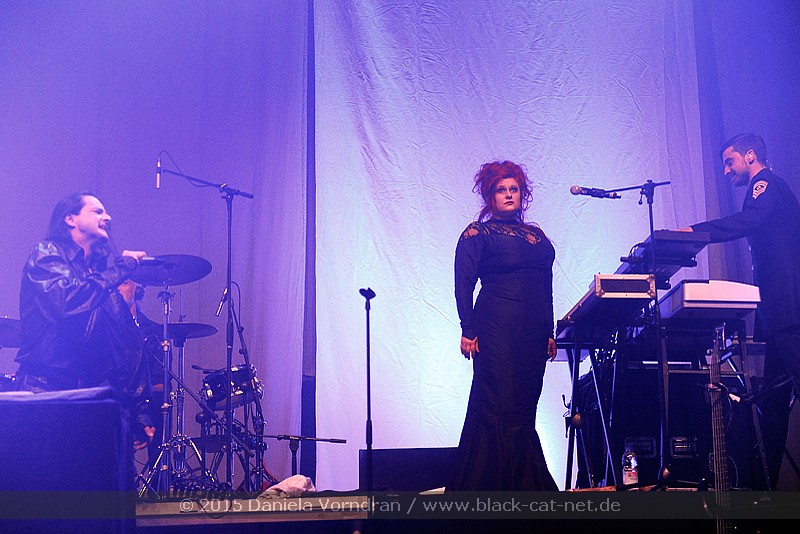
RoD: Let’s get back to 2015. That’s when you presented some extracts from your musical ‘Menschenstille’ at the gigs in the framework of WGT, Amphi and other performances in that period of time. Why did you choose these gigs for the presentation? And why did the premiere take place in Bayreuth?
Oswald Henke: Bayreuth is my hometown, and in Bayreuth I can do it at minimal cost. For this reason, ‘Menschenstille’ was staged here. Both WGT and Amphi festivals funded ‘Menschentille’ from their income, so we presented excerpts from ‘Menschentille’ there with the purpose to raise interest in the performance. As I previously mentioned, I consider the performances of Goethes Erben at festivals to be as a promotional aspect.
RoD: Please tell us about the history and development of ‘Menschenstille’.
Oswald Henke: ‘Menschenstille’ is a performance about the depression, about the game of suicidal thoughts, about the suffering of a person and the variety of misery of society. We are talking about the attempt of the subject to find a place within a harsh society in which something experienced, something sorrowful and even something happy can be found. That probably makes ‘Menschenstille’ a performance reflects the zeitgeist. Today, Germany is far from being a tolerant country again. The scapegoats, pillories, funeral pyres help the society to feel better itself staying the faint-hearted.
Meanwhile it does not matter to the "concerned residents" who will be the target: either homosexuals, or foreigners, or just dissenters. Ultimately, the lack of education is perhaps the biggest problem. Humankind will begin to develop in the opposite direction; will be blind in moral sense. What place is designated under these circumstances for a loner with his pain, fears, worries? ‘Menschenstille’ deals with this issue in fast motion. “Slow still-life”, through which we learn to see again... GOETHES ERBEN is polarized with this performance – and it is important because sometimes it’s necessary to hurt in order to become conscious and to understand what makes us human; and it includes something the most important: the ability to feel anything and above all to prevent it.
RoD: ‘Menschenstille’ involves a very complex matter, philosophy, eternal theme of death and life. As a rule, the creation of such creative material is very hard for its Creator, first of all, emotionally. How did you overcome it?
Oswald Henke: I lost someone I cared about, who committed suicide. So I decided to consider this topic by choice, and it was important to be able to interpret it correctly for myself. This performance is primarily designed for people who have to live with the fact that someone disappeared from their lives because of suicide. Many people have these gaps in their lives and it is very difficult to discuss this topic with the outsiders. This performance can be understood individually and privately, but nevertheless, everyone knows that they are not alone with that in mind. This performance was important to me, as I could understand myself step by step, in such an action as suicide and associated losses.
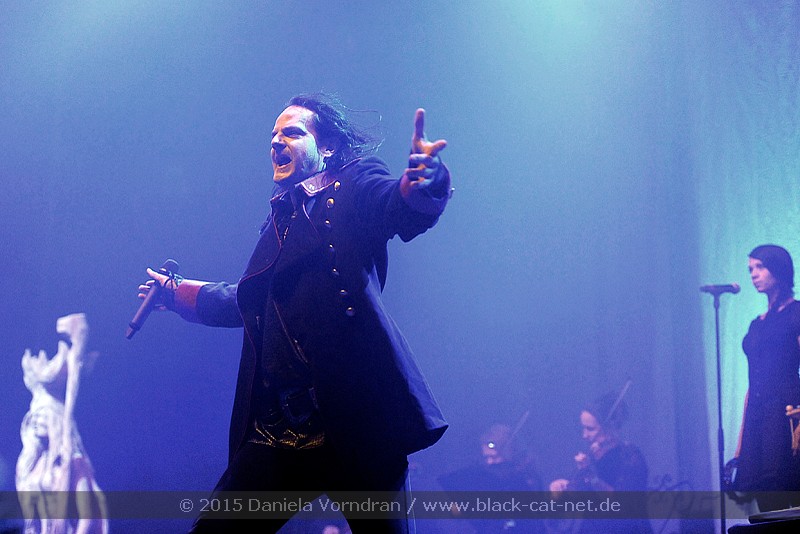
RoD: A large number of musicians, artists of different projects in different directions joined the troupe. How did you manage to put everybody together in a musical? And tell us more about the ‘Menschenstille’, please.
Oswald Henke: We spent a year working on music for the performance, and I used many passages from the book ‘Narbenverse’ in a different way and also made changes putting some other passages too. Then we have been rehearsing for almost a year and have been gradually staging it for six months. I chose eight dancers on the recommendation of the Sonja Kraushofer and I worked with them on choreography. I allowed them to bring their ideas in a dance and interfered only if certain things had to be explained by means of the dance. The music group was rehearsing independently almost all the time, without dancers and acting scenes. I finally brought everything together in August, 2 months before the premiere. Previously everything existed just in my head, and I think sometimes it was hard for musicians to imagine what should happen on stage. Also the shift to the dance from the rehearsal place with pre-recorded music was planned to musicians. This whole scheme worked because everyone involved were doing their best and helped to make this performance real. In total we had 10 musicians, 8 dancers / actors, 4 technicians, 1 dresser, 2 stylist + makeup artists, and also 2 stage assistants, 2 cooks and 2 deputies. In addition, thanks to Remo Sorge - the sculptor of wood - our decorations in the first act were real works of art, because he made 5 of his wooden statues available to us. They were an important part of the first act and perfect for this performance.
RoD: So, from internal to external. In time of the general optimization, rationalization, some kind of "thrift" of modern dark scene, the scale of the decorations, the outfit of your musical astounds! How much time was left to prepare the visual component?
Oswald Henke: The process was dragging on for more than two years; I have bought things that I knew would be necessary for performances a few months earlier. Karst Koehler started to make costumes a year before the premiere. It was very important for me to make the performance correspond to the content visually. But I understood that it was very expensive and I would have no material benefit. But I wanted to do it. The outcome was poor, but the balance could become equal by selling DVD. How many hours did I work on the performance? I’ve no idea. It was the last two years of my life in which I invested the money and spent it in order to be able to realize the performance.
RoD: After the release of the DVD ‘Menschenstille’ you also released a movie-version. Was it frightening to appear on the big screen? I mean live performances are the interaction, the “chemistry” with the audience, a chance to see the reaction online. The DVD is already quite different. But "big screen" in a sense, is unforgiving. It has its own magic and rules. What kind of experience was it for you?
Oswald Henke: The video materials was recorded in a proper quality as well as compressed for the DVD format. In the cinema, the picture looked impressive, clear, expressed the smallest details very close and bright. Unfortunately, the screenings weren’t taken well, and I was annoyed by it, because in such a way I wanted to bring it to people who were unable to come to Bayreuth. But that’s still not what I wanted, because the movie does not give the opportunity to experience the performance entirely.
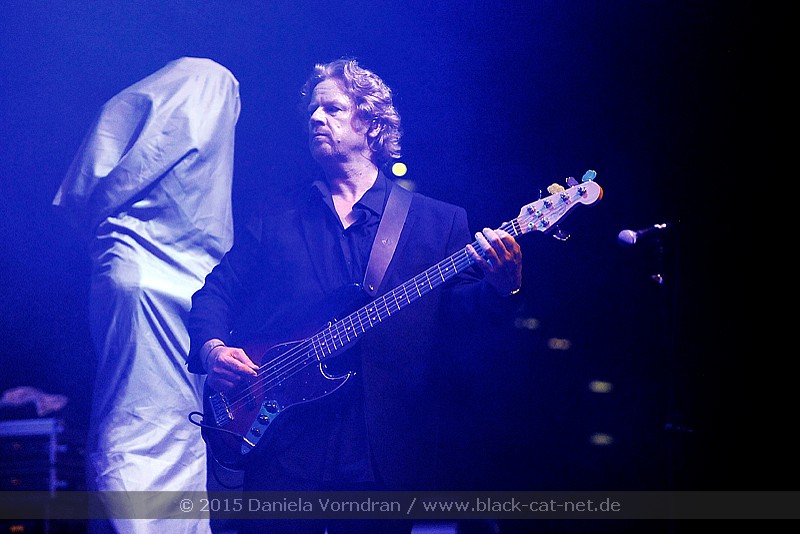
RoD: Last year the project of Alexander Kaschte, SAMSAS TRAUM, released a concept album ‘Poesie: Geschichte Friedrichs’. I do not want to go into comparison in any way, but ‘Poesie…’ also is not another invented story about something "Gothic". It is also a mature, serious work on real tragedy. What do you think, is it possible to speak about the prevailing trend? Is it the returning of the old guard of dark scene with more conscious and more "weighty" material? If Yes, then what is the reason?
Oswald Henke: I can only speak for myself. I do the creative work when I have necessity to share something, or when I’m burning from the inside because of some topic. I don't have to give concerts to feed my ego. I don't have to release a CD, to fill the media under the contract or to earn money. I do what I want and work together with people who also want to work with me, for this reason, I have no more standing group, but ever-changing team in which there are such “anchor points” as Marcus Kestner or Sonja Kraushofer, temporary guests like Carsten Klatte, the newcomers: Martin Heart and returned Cornelius Sturm. The only constant is me.
RoD: Well, a little trip into the past again. You gave a concert in St. Petersburg with the project FETISCH:MENSCH in 2011. What are your impressions from this concert and Petersburg in general?
Oswald Henke: St. Petersburg is a beautiful city and the fans from Russia felt the euphoria. Unfortunately, the concert was not advertised at all, and thus there was very little audience. That’s unfortunate, because there is not short distance between Germany and Russia, and this was the only show FETISCH:MENSCH in Russia because there won’t be more concerts of FETISCH:MENSCH in the future.
RoD: And finally, the question you have been asked more than once, I suppose, but still... Is there any difference in audience geographically? Do the audience and the reaction of them in your native Germany differ from those of the other countries? I mean not only live performances, but also fan base, reviews and comments on your work. Where do the most active judges of your art live?
Oswald Henke: We have the highest number of fans in Germany, as well as a lot of fans in Austria, Belgium and Mexico and the possibly increasing number in Russia. We met the audience, which was the most enjoying the concert, in Mexico, and also in Belgium, the audience was more relaxed and emancipated than in Germany. I think the difference is that the German-speaking audience is able to understand and try to figure out, and people abroad just enjoy the atmosphere and don’t focus so much on the lyrics.
We express gratitude for the organization and preparation of this interview to Catherine Breydy and Daria Tessa and also to Daria Gorbunova for the translation. The interview was prepared by Viola Noir.
The Russian version of the article is available at http://gothic.com.ua/Interviews/interview_2016_Goethes_Erben.html
All Pictures by Daniela Vorndran (http://www.vorndranphotography.com / http://www.facebook.com/blackcatnet)





